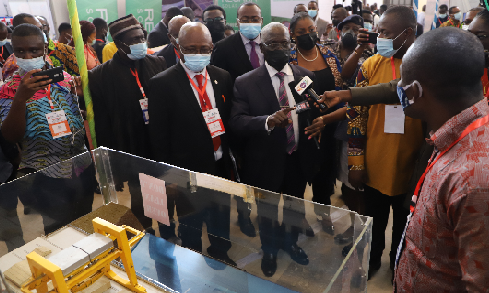
Take advantage of AfCFTA to make Ghana an industrial hub - Osafo-Maafo charges local industries
Senior Presidential Advisor, Mr. Yaw Osafo-Maafo, has urged industries to reposition themselves to tap into the opportunities presented by the African Continental Free Trade Area (AfCFTA) to ensure Ghana becomes the centre of industrial establishments in Africa.
He said the establishment of the AfCFTA Secretariat in Ghana presented a bigger market to local industries which they must exploit by targeting markets within the continent to help put Ghana on the map as an industrial country.
Advertisement
That, he indicated, would help strengthen the national currency and reduce the high unemployment rate which had become a national security concern.
GISE
Mr. Osafo-Maafo was speaking at the 4th edition of the Ghana Industrial Summit and Exhibition (GISE) which took place in Accra yesterday.
The event, which was organised by the Association of Ghana Industries (AGI), in partnership with the Volta River Authority (VRA), was on the theme: "Repositioning Ghanaian Industries to leverage the AfCFTA.”
It brought together the business community in the country to contribute to the discussion on leveraging the benefits the AfCFTA presents.
It also presented an opportunity for them to network and showcase their products and services to prospective clients and investors.
Competitiveness
“I believe strongly that with the location of AfCFTA in Ghana, we have no reason not to succeed as an industrial country in Africa. We are forced by circumstances to produce and compete. So this is your chance to make Ghana proud”.
“Concentrate on the production and produce competitively, this is because if you produce and the products cannot compete in the Africa market, it becomes a problem and the vision of becoming the centre of industrial establishment in Africa will not be realised,” Mr. Osafo-Maafo said.
He noted that the government also owed industries the duty to provide an environment that would make them competitive and that included taxation, utility and uninterrupted power supply.
For that reason, he gave an assurance that the government was ready to provide such an environment to ensure businesses in the country were competitive in the African market.
Going forward, Mr. Osafo-Maafo also urged the banking sector to support the local industry to grow.
“It is not enough for banks to only show fat profit at the end of the year; it is equally important for them to also show an industrial establishment they have supported to succeed”.
“It is not only about having a good balance sheet with very good profitability but it is also better for you to say I made this industry. You have a job to support our industry so that they succeed,” Mr. Osafo-Maafo indicated.
Opportunities of AfCFTA
The Deputy Minister of Trade and Industry, Nana Ama Dokua Asiamah-Adjei, noted that the AfCFTA provided enormous opportunities and leveraging it would help boost Ghanaian export to stimulate investment and innovation.
She said that its effective implementation depended on empowering the businesses at all levels to take advantage of the opportunity in intra-African trade.
She indicated that the ability of businesses in the country to first understand and capitalise on trade-related opportunities offered by AfCFTA could not be underestimated.
Nana Asiamah-Adjei, therefore, said there was the need for public sensitisation forums and workshops on the implementation of the agreement as well as the protocols and operations required for effective trading.
For this reason, she said the government , since 2017, had pursued programmes that had advanced the country’s readiness to harness the benefit of AfCFTA.
The notable one among them, she said, was an implementation of a comprehensive industrial transformation programme which was intended to develop Ghana as the leading manufacturing hub in Africa to take advantage of the market access opportunities.
Going forward, she said the government would ensure that Ghanaian businesses benefited from the agreement by providing export credit insurance and guarantees to enable them to thrive.
Government’s initiatives
For his part, the President of the AGI, Dr. Yaw Adu Gyamfi, noted that the COVID-19 pandemic had been a major setback to businesses in the country, indicating that 80 per cent of businesses were affected last year.
However, aligned with government’s initiatives such as the CARE Obaatanpa programme, he said businesses were determined to build resilience, anchored on government’s stimulus measures to reignite growth.
“We are anxious to see the full rollout of government’s support and the establishment of the new Development Bank Ghana.
A number of our industries are already under-capitalised and the impact of the pandemic further precipitates the need for finance to resuscitate some worst-hit sectors,” Mr. Adu Gyamfi indicated.



